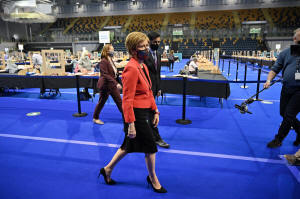Key Scottish election on knife edge as pro-independence party heads for
win
 Send a link to a friend
Send a link to a friend
 [May 08, 2021]
By Russell Cheyne [May 08, 2021]
By Russell Cheyne
GLASGOW, Scotland (Reuters) - The Scottish
National Party (SNP), which has vowed to hold an independence referendum
that could tear the United Kingdom apart should it be returned to power,
will find out on Saturday if it has won a majority in Scotland's
parliament.
The SNP says it will seek to hold a new vote on secession if a
pro-independence majority is returned to the devolved 129-seat
parliament. This would set up a clash with British Prime Minister Boris
Johnson, who says he will refuse any such vote because Scots backed
staying in the United Kingdom in 2014.
Initial results showed the SNP on course for a fourth consecutive term
in office having triumphed in 40 of 49 seats declared so far, including
in three key battlegrounds.
But some areas saw an increase in support for opposition pro-union
parties, indicating the final outcome would be very close. The final
results will be announced later on Saturday.

The electoral system - which allocates some seats on a proportional
representation basis which helps smaller parties - might see the SNP
fail to win an outright majority, something First Minister Nicola
Sturgeon, the party leader, acknowledged.
"I have never taken that (an outright majority) for granted and it has
always been on a knife edge," she said.
There is likely still to be a pro-independence majority even if the SNP
fall short because of the Green Party, which also supports secession.
But supporters of the union argue that without an SNP majority, there is
no mandate for a referendum.
Scottish politics has been diverging from other parts of the United
Kingdom for some time, but Scots remain divided over holding another
polarising vote on whether to end their country's 314-year union with
England and Wales.
"IRRESPONSIBLE AND RECKLESS"
Britain's exit from the European Union - a move opposed by a majority of
Scots - as well as a perception that Sturgeon's government has handled
the COVID-19 crisis well and antipathy to Johnson's Conservative
government in London, have all bolstered support for Scotland's
independence movement.
[to top of second column]
|

Scottish First Minister Nicola Sturgeon arrives at Glasgow counting
centre in the Emirates Arena in Glasgow, Scotland, Britain May 7,
2021. Jeff J Mitchell/Pool via REUTERS

Scots voted by 55%-45% in 2014 to remain part of the United Kingdom,
and Johnson says that was a "once in a generation" vote. Polls
suggest the outcome of a second referendum would be too tight to
call.
The British government says Johnson must approve any vote for it to
be legal and he has made clear no such approval would be
forthcoming.
"I think a referendum in the current context is irresponsible and
reckless," he told the Daily Telegraph newspaper.
Sturgeon herself has ruled out holding any vote until after the
COVID-19 pandemic, with the SNP indicating it would be held by the
end of 2023. She argues there would be no moral or democratic
justification for Johnson to refuse a referendum if the Scottish
parliament passes a bill to hold a vote.
"The results are looking like what we expected, that with the
Scottish Greens there will be a pro-independence majority in the
Scottish parliament and we take that as a clear mandate from the
Scottish people to hold another referendum," Lorna Slater, co-leader
of the Scottish Greens, told the BBC.
"I think Boris Johnson doesn't want a referendum because he knows
he's going to lose."

With Sturgeon ruling out holding an illegal or wildcat plebiscite,
it is likely that the issue will ultimately be decided by Britain's
top court.
(Writing by Michael Holden and Andrew MacAskill; Editing by Gareth
Jones)
[© 2021 Thomson Reuters. All rights
reserved.] Copyright 2021 Reuters. All rights reserved. This material may not be published,
broadcast, rewritten or redistributed.
Thompson Reuters is solely responsible for this content. |